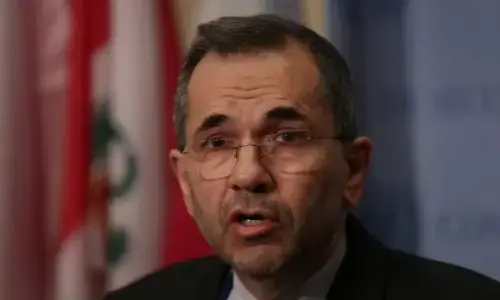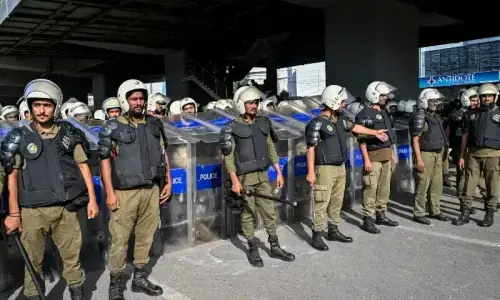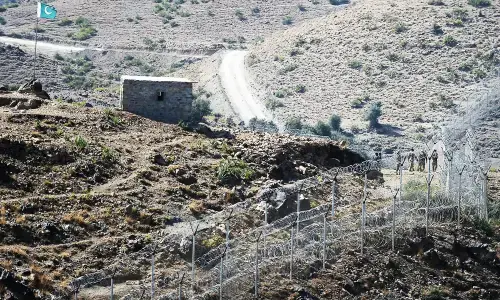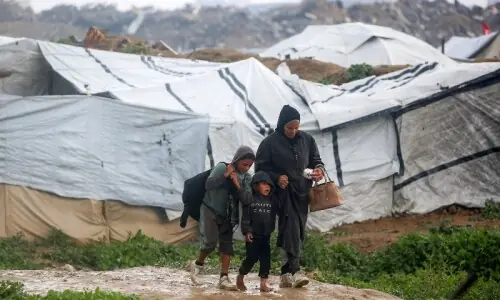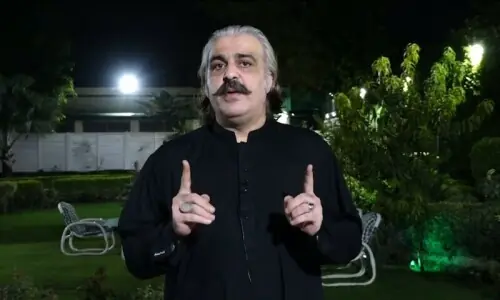Mother of all deals
THE news is not that dog bit man but that man bit dog. The news is not that Pervez Musharraf swept the elections but that eight parliamentarians voted for former justice Wajihuddin Ahmed. There should be a national search for these eight people who had the gumption to flow against the tide.
This is the real news in a country where everyone seems to be abandoning idealism and moving towards pragmatism. Why should we speak of American neo-conservatives when Pakistan has a sufficient number of its own, who have no time for values, beliefs or idealism.
A pragmatist recently admonished me for not seeing the Bhutto-Musharraf deal as the best kind of politics that would bring stability to the country. In the end, all pieces of the puzzle have come together and a new era of continuity is about to start.
All important stakeholders have struck a deal to jointly serve their personal interests and also to fight the common and greatest threat of extremism. However, what comes out of this acclaimed reconciliation will be determined by how the ‘mother of all deals’ was struck, what are its essential components and who are the main beneficiaries.The deal is essentially three-layered. Contrary to what most people believe that the greatest beneficiary is Ms Bhutto, it is the army that has the largest stake in the new political arrangement. The deal is fundamentally between Musharraf and his army which wants him to exit and create room for the organisation to breathe more normally.
The military has come under a lot of criticism. It was to save its tarnished image that it became important for the institution to maintain a safe distance from the most controversial man at the top.
The next important layer pertains to the understanding between the military and its external patrons that an environment must be created to allow the army to fight extremism in the country and the tribal areas in an undistracted manner. The war on terror, which has cost the army more than 1,000 lives and at times a lot of embarrassment, cannot be fought without some semblance of normalcy in the corridors of power. There are too many people critical of what is happening in Waziristan and disowning the war as an American one mainly due to their differences with General Musharraf.
The need to develop a consensus in Islamabad led to the third level of the deal which was between Ms Bhutto and the now about to be Mr Musharraf. In fact, a closer look will reveal a series of independently struck deals with leaders in exile or within the country.
Such an intricate ‘mother of all deals’ will have a bearing on future politics. Since the ultimate objective is to keep the military strong and intact and capable of delivering to its foreign patrons, the new political design will be such that no single stakeholder is in a position to rock the boat.
It is quite probable that the Sharif brothers will also be allowed to return to the country, contest the elections and manage to capture central or urban Punjab where they are most popular. Besides making Musharraf look good in the eyes of his foreign patrons and domestic cronies, allowing the Sharif brothers back would ensure that they stick to their bare minimum role of keeping the PPP and others in check.
This, however, is not the only way of checkmating the PPP. The present regime has achieved what Gen Zia could not with his hard coercion, which is to break the PPP leading to its disintegration. This job is being accomplished most successfully by playing on the fears of Ms Bhutto, appealing to her natural instinct to survive and gain power and through ingenious ways of maligning her.
The discussions were dragged on for a long time and allowed to become public so that the PPP leadership lost its credibility. Although Ms Bhutto can still claim her loyal vote bank, the fact remains that a number of PPP workers are so heartbroken at the turn of events that they might not even want to vote. The regime consciously calculated its steps to break the party and now believes that Ms Bhutto on her own cannot bag more than 40 to 50 seats in the National Assembly.
In the name of political stability and the fulfilment of objectives of the primary layers of the deal, the PPP would be transformed into a regional party confined mainly to Sindh where it would share governance with the MQM, of course with some presence in the centre.
The role in the centre might be curtailed so as not to allow Ms Bhutto a clear majority to form the government or to threaten Article 58 (2) (b) of the Constitution at some future date. Members of the regime desire to make Bhutto and Sharif a phenomenon of the past.
Although many believe that Ms Bhutto will be the next premier, the preference would be for someone more docile and manageable like Shaukat Aziz who has no domestic constituency or ambition beyond serving his masters loyally. Many believe that Shaukat Aziz has come to the end of his political career in Pakistan but might still be a candidate for the prime minister’s slot unless Musharraf and his partners find a new face.
Both Washington and Islamabad should duly award Aziz for keeping the books reasonably balanced and pursuing the neo-liberal agenda of the state. He also does not pose problems which real politicians do, such as questioning the authority of the GHQ from time to time. A docile prime minister is the key to the deal between Musharraf and the GHQ. In any case, Musharraf has already announced that he would prefer a prime minister who agrees with his vision for Pakistan and cooperates with the army chief and him.
This formula is what the government considers the right recipe for national consensus, which it claims will strengthen democracy. The formula is highly undemocratic because it will mean an extremely weak and fledgling opposition — not conducive to democracy and good governance. It would not be surprising if Imran Khan is the only person sitting in the opposition provided he wins a seat. The other possible candidate for the opposition could be Qazi Hussain Ahmed. But again, the Jamaat is a centrist party which will eventually reconcile with the GHQ.
Are we going to get reconciliation through this formula? Perhaps not. National reconciliation is not possible without its other essential component which is the truth. Unfortunately, the issue here is that all prospective partners have come together to protect their loot and plunder and personal power, and will not necessarily come clean on their past mistakes.
Each actor will try to get closer to the GHQ and win the army chief’s favour or that of the president. Moreover, the formula for reconciliation has its basis in the encouragement of criminality. The people of Pakistan have now learnt that one can plunder and get away with it in the name of saving the nation from the larger threat of extremism.
How will extremism ever end in a country where the elite has ganged up against the people, the middle class is co-opted and there is no room for idealism? In a few years, the stink from a stagnated socio-political system might become unbearable and encourage the ‘wretched of the land’ to look at other alternatives.
The writer is an independent analyst and author of the book, ‘Military Inc.: Inside Pakistan’s Military Economy’.
E-mail: ayesha.ibd@gmail.com
‘Beeba’ takes on BB
IN a recent interview to Dawn News, President Pervez Musharraf displayed his growing understanding of Punjabi by mentioning Chaudhry Shujaat Husain very fondly as being ‘beeba’. The Punjabi term is hard to translate into English.
Our in-house expert on the language, Shafqat Tanvir Mirza, says it could loosely fit the term ‘docile’ or ‘goody-goody’. Since Gen Musharraf appeared to have used the term in a positive sense, perhaps he was invoking the meaning of honesty and earnestness that the term enshrines.
Gen Musharraf was qualified to give the verdict on an associate as close to him as Chaudhry Shujaat. The general has known Chaudhry Shujaat Husain since the days both went to Forman Christian College in Lahore together. Leaving the college in the early 1960s to pursue a career in the military, Mr Musharraf must have kept track of the honest and earnest politics followed by his old college mate for him to have chosen Chaudhry Shujaat to look after his political interests in the country after he assumed power in October 1999. The two partners have held fast to each other through various crises, with the politician delivering every time to the military chief’s order.
Chaudhry Shujaat played a crucial role in discovering prime ministerial material in Mir Zafarullah Jamali, and to this day Jamali holds Shujaat responsible for his eventual ouster from the prime minister’s office in June 2004. The big man from Balochistan is reported to be unhappy at the way the recent presidential polls have been conducted and is quoted as saying that the situation would have been different if there had been true democracy in the country.
Chaudhry Sahib, meanwhile, is standing by Jamali’s replacement in the prime minister’s house and nonchalantly lecturing one and all on how to bluff and trick your way out of a political predicament. About that later; first a look at a couple of other instances in recent history where Chaudhry Shujaat outwitted the ‘other side’ to clear the path for his boss.
About two years ago, the Musharraf regime was keen on showing the world that they were honestly and earnestly involved in seeking a solution to the Balochistan problem. The Gwadar port was high on the government’s development priorities and the attacks on the pipeline on natural gas emanating from Sui were giving the officials a headache. The fires in Balochistan had to be somehow extinguished and no one else was considered more capable of leading the government’s thrust for peace than good old Chaudhry Sahib.
In the company of an equally suave Syed Mushahid Husain, Chaudhry Shujaat Husain almost brought credibility to his campaign in Balochistan. At one point in the year 2005, an impression was created as if most of the dividing issues concerning Balochistan and the insurgency in the province spearheaded by Nawab Akbar Bugti had not only been identified, they were about to be settled. We heard at one stage that out of a total of around 30 issues, only one remained to be sorted out.
That wasn’t to be. Balochistan was never settled in the way Messrs Husain and Husain had once promised Pakistanis. Bugti’s proved to be a ‘suicidal’ journey that ended with his death in August 2006. Chaudhry Shujaat emerged unscathed from the episode, and not long afterwards he was to play the chief official negotiator as the Musharraf government, ostensibly at least, attempted to bargain with the clerics holding Islamabad’s Lal Masjid.
Once again, Chaudhry Shujaat had the credentials to speak to the rebels on the government’s behalf. In trying to get the goods out of Jamali and Bugti he was banking on his and his family’s links with the two seasoned politicians from Balochistan. In the Lal Masjid instance in July this year, he was considered to be a moderate member of the government with a tilt towards and an old relationship with the Islamists that could come in handy in sealing a deal.
Chaudhry Shujaat almost succeeded again. He managed to convince and persuade the mosque-takers to lay down their arms. He ordered food to celebrate the amicable culmination of one of the scariest nightmares that the country had been through in its 60 years. A few hours later the government troops stormed the mosque and killed the rebel commander along with scores of others. A day later, Chaudhry Shujaat returned to the centre-stage, this time promising a deal for Lal Masjid students who had been abandoned by the closure of the Jamia Hafsa madressah attached to the mosque.
In the true moderate Pakistani style that he seems to have perfected, he guaranteed good education and subsequently an all-paid-for marriage for the students who were to come under his guardianship.
But for the shortsightedness of its leadership, the Pakistan People’s Party should have been alarmed when the government nominated Chaudhry Shujaat Husain to iron out a deal with the PPP. The fate met by Akbar Bugti and Maulana Abdullah Ghazi is instructive of what talking to Chaudhry Shujaat as a Musharraf spokesman could lead the people sitting on the other side of the table to: annihilation.
In reality, the party would do well to leave others to their insecurities and try and come out with explanations for the deal that are acceptable to the people to secure itself against popular ire. Chaudhry Shujaat may be wrong this time. He may have even qualified for reprimands from the highest authority in the land for his remarks against the PPP. BB may or may not emerge as a partner of General Musharraf in future. She may invite harm to her party either way.
Liberals at war in India
THE political scene in India is hotting up. The general election is still one-and-a-half years away. Yet, every party, small or big, is preparing itself for the eventuality of early polls because the Manmohan Singh government is tottering in the crossfire between the Congress and the Left.
Congress president Sonia Gandhi has fired the first salvo by blaming the Left publicly, without naming them, for stalling India’s development while opposing the Indo-US nuclear deal. The Left has reacted harshly, even though she has explained to its leaders personally that they were not her target.
Even the last-minute formula did not work. The government said it would hold talks with the International Atomic Energy Agency (IAEA), a requirement under the deal, without finalising these until after the discussion with the Left. Obviously, there was loss of faith in the government.
The Left has, however, made it clear that if the Congress wants a mid-term poll, it is ready for it. So far they were not saying so lest they should be blamed for early elections. The voters are generally wary of a party which pushes them towards a mid-term poll because of the unnecessary expenses involved.
It is apparent that the Left was led up the garden path and given to understand that the Congress wanted to work out a formula which would accommodate the Left’s concerns. The Congress, it turns out, was all the time in touch with Washington to assure it that New Delhi would talk to the IAEA before the deadline.
The Congress may honestly believe that the Indo-US treaty was the best thing that has happened to the country. But, in all fairness, it should have been categorical from day one and not created a smokescreen to mislead the Left and other liberals. All of them honestly believed that the Manmohan Singh government was discussing with America how to mollify their fears and would tell them how.
It is a pity that the two parties, with liberal credentials, have come out in the open to attack each other. This reminds me of what Jawaharlal Nehru said in August 1945. In a letter to Palme Dutt, a British communist leader, he wrote: ‘You must realise that it pains me to see the gulf that has arisen between the Congress and the communists in India.’
The fallout of the quarrel between the two may benefit the Bharatiya Janata Party which was practically out of the reckoning until recently. The party was still divided between the supporters of Atal Behari Vajpayee and those of L.K. Advani. But the split among the liberals has made the party close its ranks. The BJP mentor, the Rashtriya Swayamsevak Sangh, has literally forced the unity.
Political developments in Karnataka have also helped the BJP regain its focus. This may push its internal squabbles into the background. Forty months ago, the BJP entered into an understanding with the Janata Dal (Secular), headed by former prime minister Deve Gowda, that it would share power — the JD(S) to be at the helm for the first 20 months.But at the end of that period, the JD(S) went back on its word. A bit of sympathy is there for the BJP, even though Deve Gowda has accused the party for turning Karnataka into ‘a laboratory for its Hindutva experiment’. Not many would buy the argument because Gowda’s son was the state chief minister.
Nonetheless, Hindutva is the BJP’s plank in Gujarat when the state goes to the polls by the end of this year to elect its new assembly. The Gujaratis, still soaked in chauvinism, are not seeing through Chief Minister Narendra Modi’s anti-Muslim bias.
The eight per cent Muslim voters have been excluded from election debate in the state. Although senior members in the BJP are up in arms against Modi’s authoritarian style, the party high command has nominated him as the next chief minister. His blatant communalism may come in handy in the future. This also means that the BJP will once again play the anti-Muslim card in the Lok Sabha polls.
In a way, India presents a strange spectacle. Modi’s communal stand is matched by an example of pluralism in West Bengal. A Muslim boy got married to a Hindu girl belonging to a rich family recently. A few days later, the boy’s body was found on the railway tracks. It was given out that he had committed suicide. The authorities, some of them probably bribed, also said so. That it should happen in a state run by the Left is a shame. Two police officials and some policemen have been suspended but the cover-up is very thick.
Yet, the Hindu neighbours of the boy’s parents and the media have brought up the whole thing in the open, forcing the government to order a judicial inquiry. What impressed one most were the joint meetings by Hindus and Muslims to seek justice. It was people versus the authorities, and no religion involved. One hopes that people will win.
One also witnessed the same courage in the media when it put the BJP to shame — the party offered apologies — after the planned killing of Muslims in Gujarat. Modi’s role has not been forgotten because he struck at the foundation of India’s democratic and pluralistic society. Non-Muslims have contributed to the rehabilitation of riot victims that is far from settled.
It is a tragedy that the BJP will once again be poisoning the atmosphere when it begins the campaign for general elections. Many people may be taken in by the party’s propaganda. The society, by and large, is secular and does not respond to the BJP’s appeal for polarisation. Still, the very fact that a party which does not subscribe to secularism thrives is a matter of concern.
Yet, the serious concern is the caste factor, the ugliest social system, which plays a big role in elections. Castes have gone beyond the classification of ‘Dalits’ and the ‘Backward Classes’. Now Brahmins and Rajputs also have their brigades with weapons. This has stratified society, trivialised politics and enhanced chances of violence.
No doubt, caste is co-terminus with class but this has eliminated the feudal order in the process. This has strengthened democracy despite the fragmentation of society. The unfortunate part is that the Mayawatis, the Lalu Prasad Yadavs and the Paswans have come to corner votes in the name of caste. They have all the ill-gotten wealth and no scruples.
The Congress should have fought against them to foster values. But the party, with its shrinking base, needs them to come to power. It would rather compromise on principles than confront them. This may be bad for the nation. But this is a fact.
The writer is a senior columnist based in New Delhi.
| © DAWN Group of Newspapers, 2007 |













